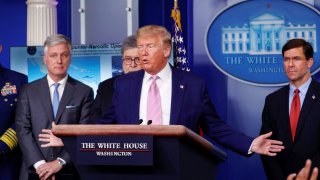
- President Trump said he will veto the sweeping defense bill that authorizes a topline of $740 billion in spending and outlines Pentagon policy.
- The GOP-led Senate overwhelmingly passed the measure on Friday and sent it to Trump for his signature.
- The Defense Authorization Act usually passes with strong bipartisan support and veto-proof majorities.
WASHINGTON – President Donald Trump said Thursday he will reject the sweeping defense bill that authorizes a topline of $740 billion in spending and outlines Pentagon policy.
"I will Veto the Defense Bill, which will make China very unhappy. They love it," Trump tweeted. "Must have Section 230 termination, protect our National Monuments and allow for removal of military from far away, and very unappreciative, lands. Thank you!"
The Republican-led Senate overwhelmingly passed the National Defense Authorization Act on Friday. The more than 70 members in support of the must-pass bill is more than the two-thirds majority that would be needed to defeat Trump's promised veto.
Congress must now vote again to override Trump.
The offices of House Speaker Nancy Pelosi, D-Calif., and Senate Majority Leader Mitch McConnell, R-Ky., did not immediately respond to CNBC's requests for comment on the president's tweet.
Money Report
The bill, which typically passes with strong bipartisan support and veto-proof majorities, authorizes a topline of $740 billion in spending and outlines Pentagon policy. It has been passed for nearly six consecutive decades.
NBC News reported that Trump is expected to affirmatively veto the NDAA, rather than employing a maneuver known as a "pocket veto," in which he would simply refuse to sign the bill for 10 days. It's unclear exactly when the president plans to veto the bill.
Trump has offered a variety of reasons for opposing the defense bill. Earlier this month, he threatened a veto if lawmakers did not include a measure to eliminate Section 230 of the Communications Decency Act, which protects tech giants like Facebook and Twitter from being held legally liable for what is posted on their platforms. Trump has repeatedly accused Twitter, his social media platform of choice, of unfairly censoring him.
Trump renewed the threat last week.
The president also said the measure posed a serious threat to U.S. national security as well as election integrity but did not give any further explanatory details.
The president's issue with Section 230 came to light this summer after Twitter added warning labels to several of his tweets that alleged mail-in voting is fraudulent. Trump has still not conceded the election to President-elect Joe Biden.
Trump has also insisted that the defense-spending bill include language preventing the renaming of military bases commemorating Confederate-era figures.
The Republican-led Senate Armed Services Committee over the summer approved a provision from Sen. Elizabeth Warren, D-Mass., requiring the Pentagon to rename military assets named after symbols of the Confederacy, the group of states that seceded from the U.S. and fought the Union in the Civil War.
"I will Veto the Defense Authorization Bill if the Elizabeth 'Pocahontas' Warren (of all people!) Amendment, which will lead to the renaming (plus other bad things!) of Fort Bragg, Fort Robert E. Lee, and many other Military Bases from which we won Two World Wars, is in the Bill!" Trump tweeted in July.
Most recently, Trump has asserted that the bill favors China.
This year's legislation includes a 3% pay raise for U.S. troops and a plan to rename military installations bearing names of Confederate leaders.
The NDAA, in its current form, does not include any measure related to Section 230.






